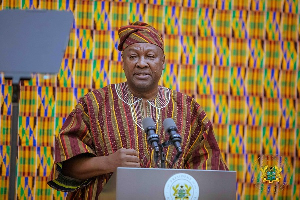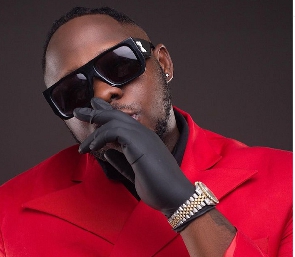• Mariama Issahaku Aabuo was discovered by Cuban doctors in the Wa region of northern Ghana
• Each of her breasts weighs around 20 pounds and this affliction prevents her from leading a normal life as she cannot even walk
• Aged 18, she could die without urgent surgery.
SHE sits all day on a pink blanket and, from her "throne," observes the members of her community going about their daily work. She has been like this for several years, ever since the accelerated growth of her breast tissue rendered her unable to walk. 
She was found by Cuban doctors seated on her throne gazing into the depths of the forest.
The tribe of the elderly Alhaj accepted her as part of its family when her father died and she was left abandoned, headed for the jaws of death, stared at by the curious, scorned by the indifferent, loved by those who still believe in all that is good in the world.
She does not know the sound of poverty, nor has she been able to say her name, or even as a woman, carry the weight of African life on her head. Since she was small she has always been accompanied by silence and the lamentation of her sorrowful eyes is her only means of expression.
She lives hidden within the Tanina community, in a sub-district of Wa, a community never previously visited by a doctor, situated 1,100 kilometers north of Accra, capital of the Republic of Ghana.
ALHAJ HAD A DREAM
One-hundred-year old Alhaj Mumuni devoted his dreams to Mariama Issahaku, the girl without a smile living in the Tanina community.
These night-time visions began to trouble him and he attended the herbalist several times for an explanation of his visions of men and women dressed in white and carrying unknown objects invading the community.
The herbalist thought that these divine visions were part of the senile dementia of the oldest man in the community, who had suffered from blindness for many years and was often incoherent.
No one could decipher those dreams until one day Yumino Alhaj’s great-granddaughter rushed headlong to where the old man was listening to the sounds of the tropical forest, and breathlessly exclaimed: "Grandfather, the people dressed in white are here and they are Cuban doctors."
MARIAMA’S HAPPIEST DAY
Professor Rodolfo Mart?nez Arias, pediatrician and head of the medical mission in Wa district, took great care over his visit to Tanina, given that it is a community in which some 655 people, a large proportion of them women and children, live in precarious conditions. This kind of tour is made every week to check the state of health of members of rural communities.
From early in the morning to the afternoon hundreds of people have received medical attention from the team of specialists comprising obstetrician Seraf?n Palma and clinical specialist Modesto Gonz?lez, both from the central province of Villa Clara; epidemiologist Mayra Cristina Pacheco; anaesthetist Lino Abel de Armas; and surgeon Elvis Pardo.
After an extensive house-by-house visit one of the specialists pointed out a small hut, slightly apart from the others, surrounded by thick vegetation as if hidden from view.
The new arrivals had no knowledge of the surprise awaiting them until Dr. Mart?nez’ sharp sense of smell took him to that sad-eyed girl, sitting on a blanket in the middle of a small grove and covered up in a strange way. They could make out an huge lump, as if she was pregnant but their surprise was even greater on seeing two enormous and totally deformed breasts. 
"This case is the result of a hypertrophy of breast tissue, almost always produced by a hormone imbalance, but a condition that can be cured with surgery," explained Mart?nez.
"Medical literature has reported cases like these and Cuban doctors in Haiti have already found a similar case which they treated successfully with surgery."
For surgeon and professor Elvis Pardo the hardest part is to "find the financial backing for this operation in Ghana because the hospital does not have the resources for this kind of surgery and the patient even less so."
WHAT CAN THE CUBAN DOCTORS DO FOR MARIAMA ISSAHAKU?
"Firstly we registered her and we will have to treat her, do some tests and, as I said, find the funding which has to be in excess of two million cedis (approximately $300 USD), a small sum considering the world in which we live where, for example, the United States spends millions on arms or espionage systems and there is a total indifference to the Third World on the part of world leaders."
If this operation is not carried out urgently Mariama could die from breast cancer as well as being socially limited, excluded, isolated in the depths of Ghana, forgotten like the many thousands who die every day and nobody knows that they were even born.
Pediatrician Mart?nez Arias believes that the funding can be found by persuading the health authorities of that sub-Saharan nation, explaining the problem to Wa community leaders, and to people able to donate the necessary subsidy.
He comments that "another possible solution would be the Cuban government, which could contribute part of our budget. Our team could perform the operation and return her to her native Tanina just a few days later.
Around 143 Cuban specialists are working in Ghana as part of a mutual governmental agreement after a proposal made by Fidel Castro to help the poorest nations. The majority the island’s doctors are offering medical attention in the most isolated areas of the countries in which they are to be found.
To date the authorities and communities to have benefited from the Cuban doctors’ help have expressed their total satisfaction. In the case of Ghana, during the ceremony to inaugurate a new monarch in the district of Sissala, Deputy Minister of Health Moises Dani Baar confirmed: "The government is highly satisfied with the work being carried out by Cuban doctors under extremely difficult conditions in rural areas where there are no local doctors."
Fortunately, Mariama Issahaku was discovered by our specialists. She continues gazing at the forest with its typical mud huts, sometimes distracted, sometimes pensive, with more hope now that the world knows of her suffering. Perhaps one day in the not too distant future she will be able to smile for the first time in her life.
* Anyone who would like to help Mariama should contact us at redac@granmai.get.cma.net












